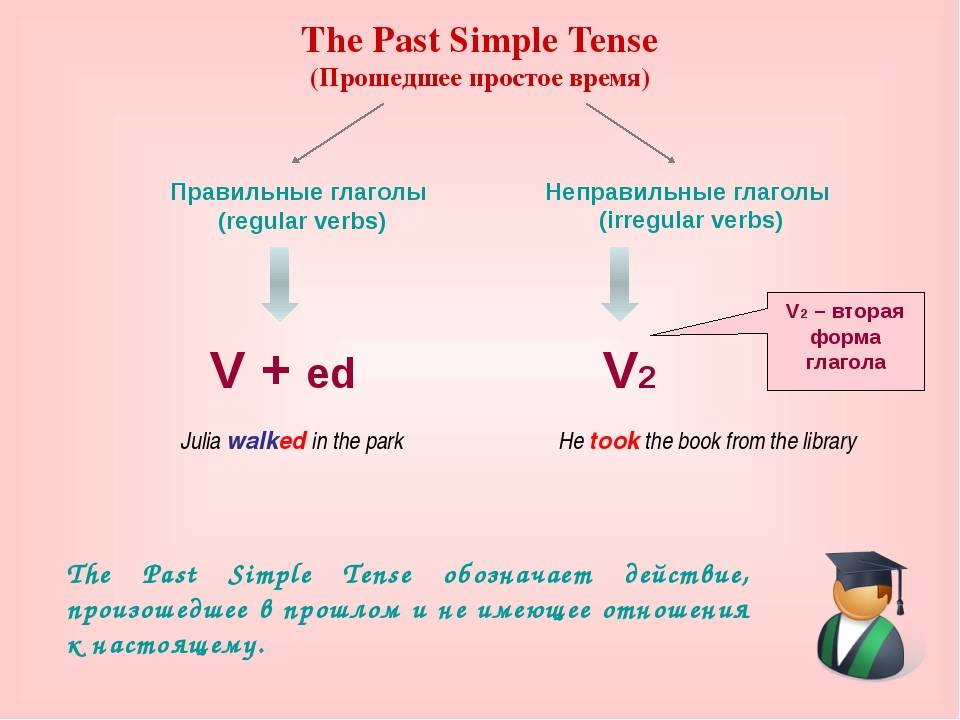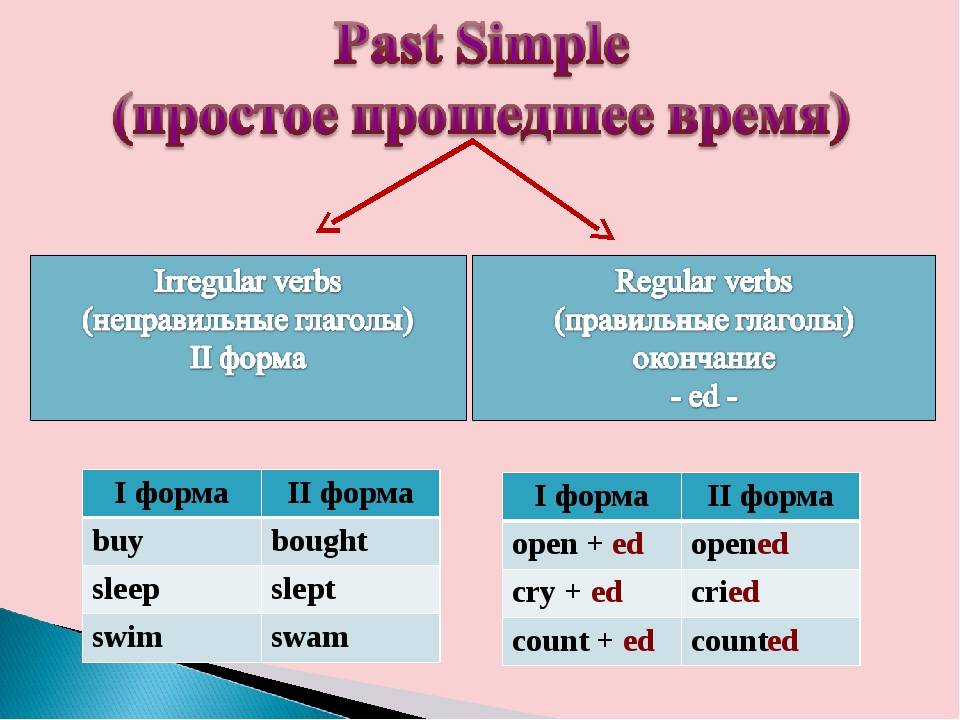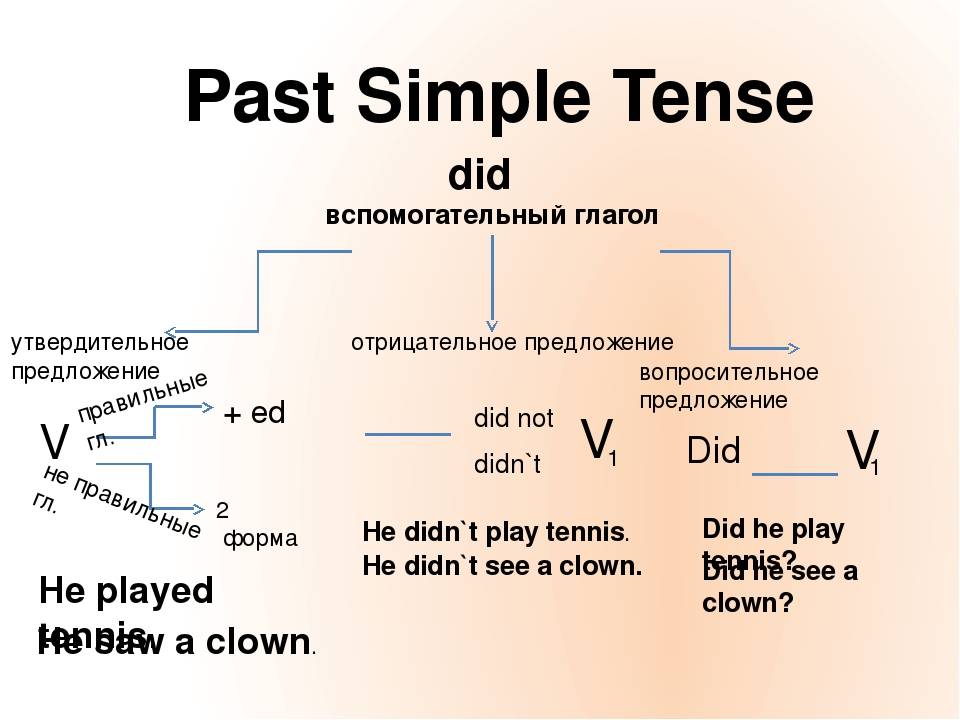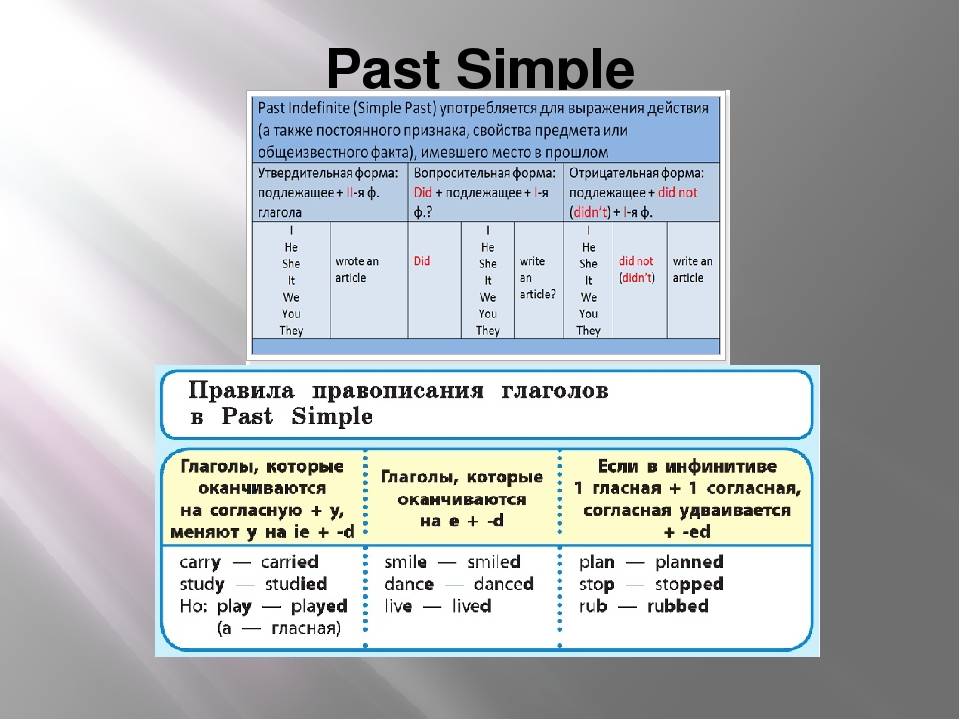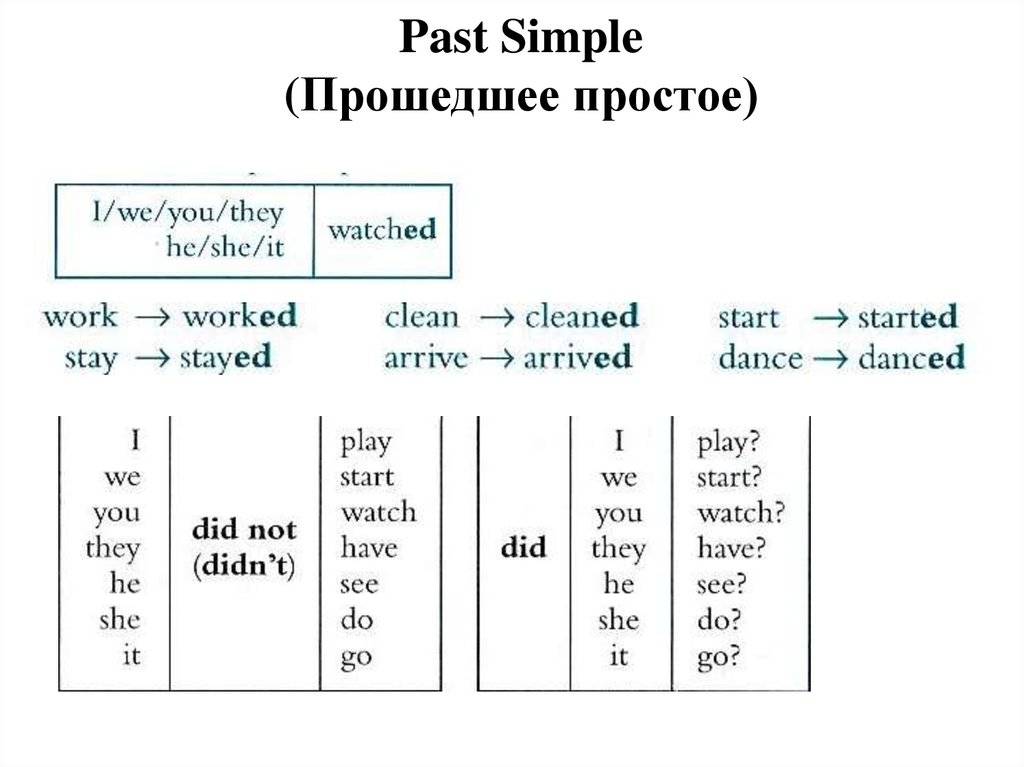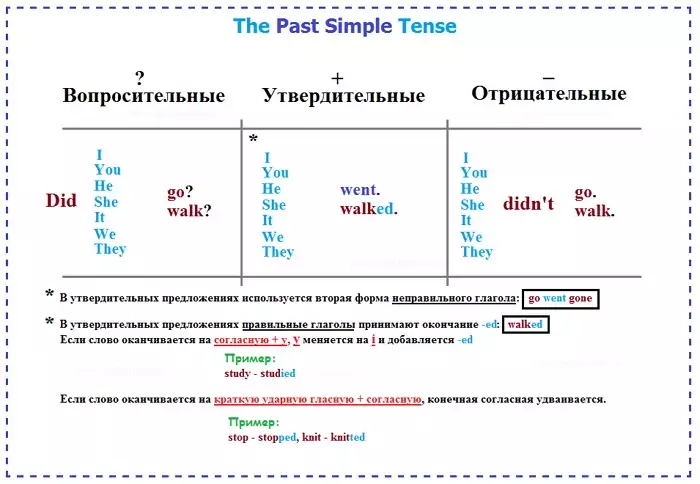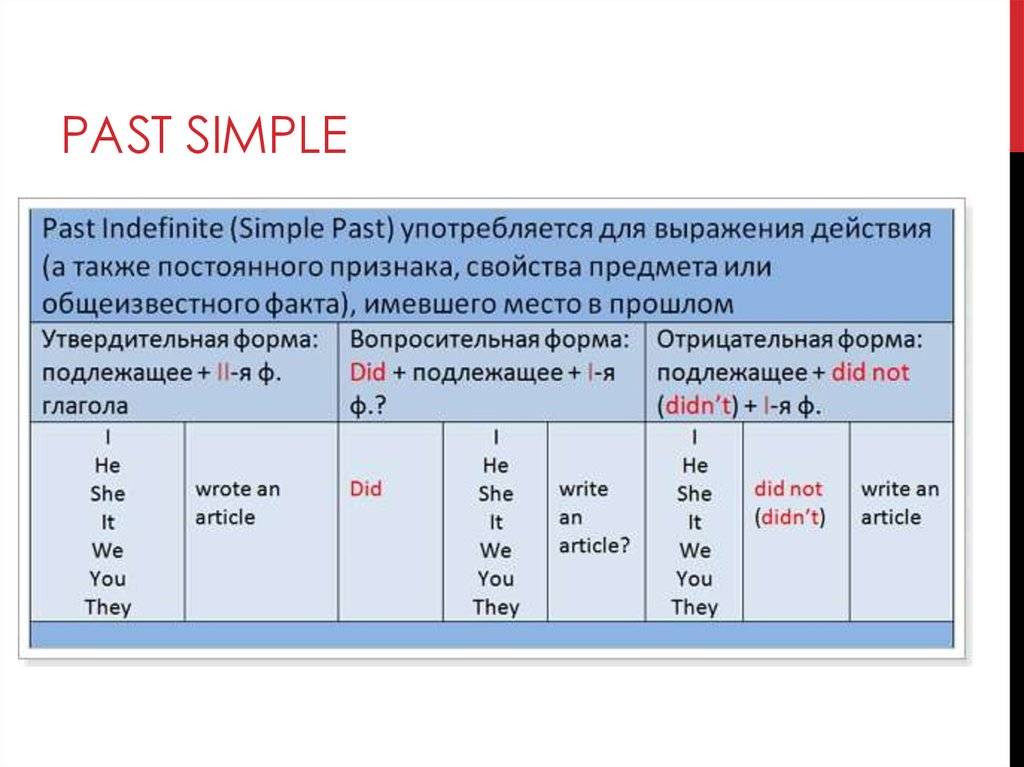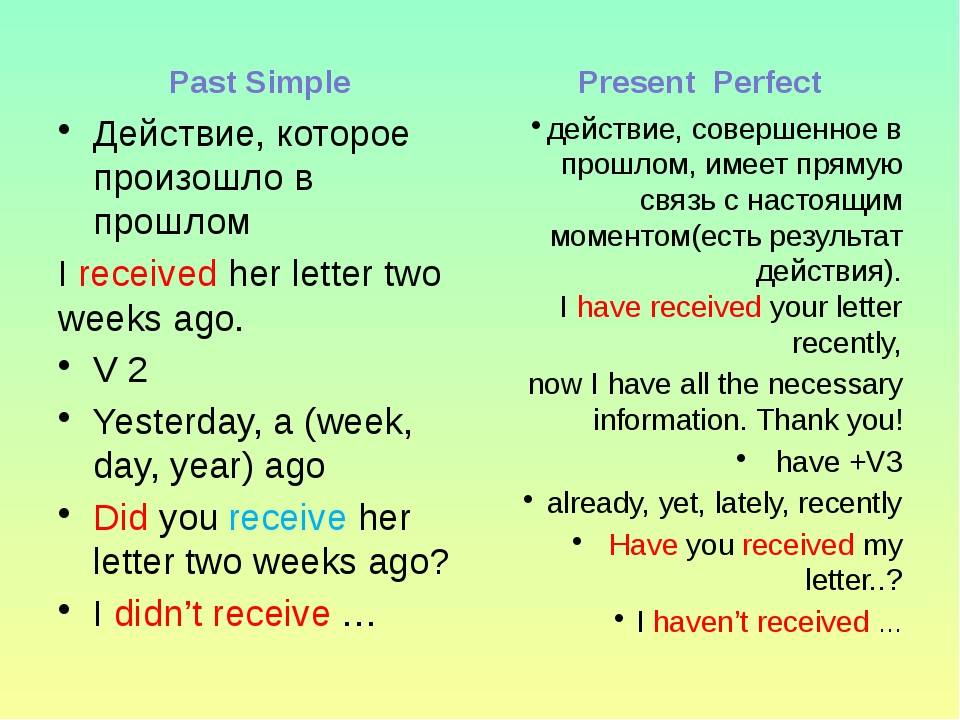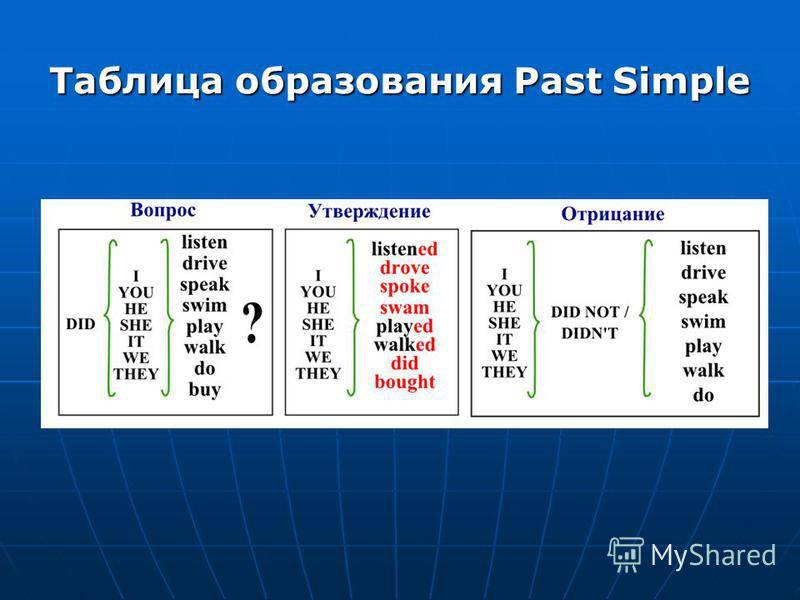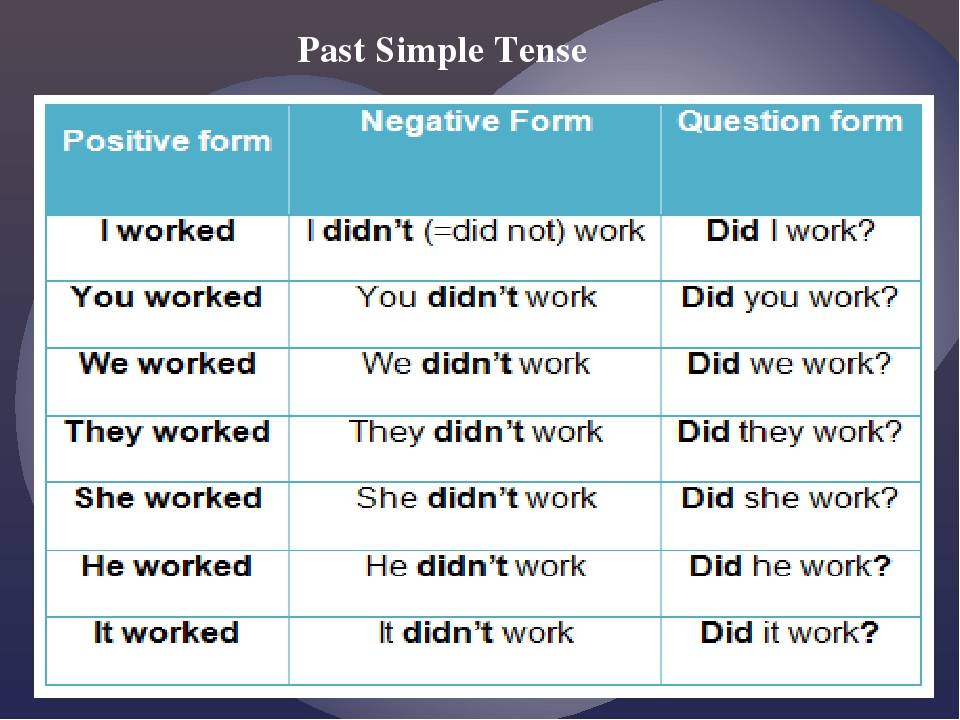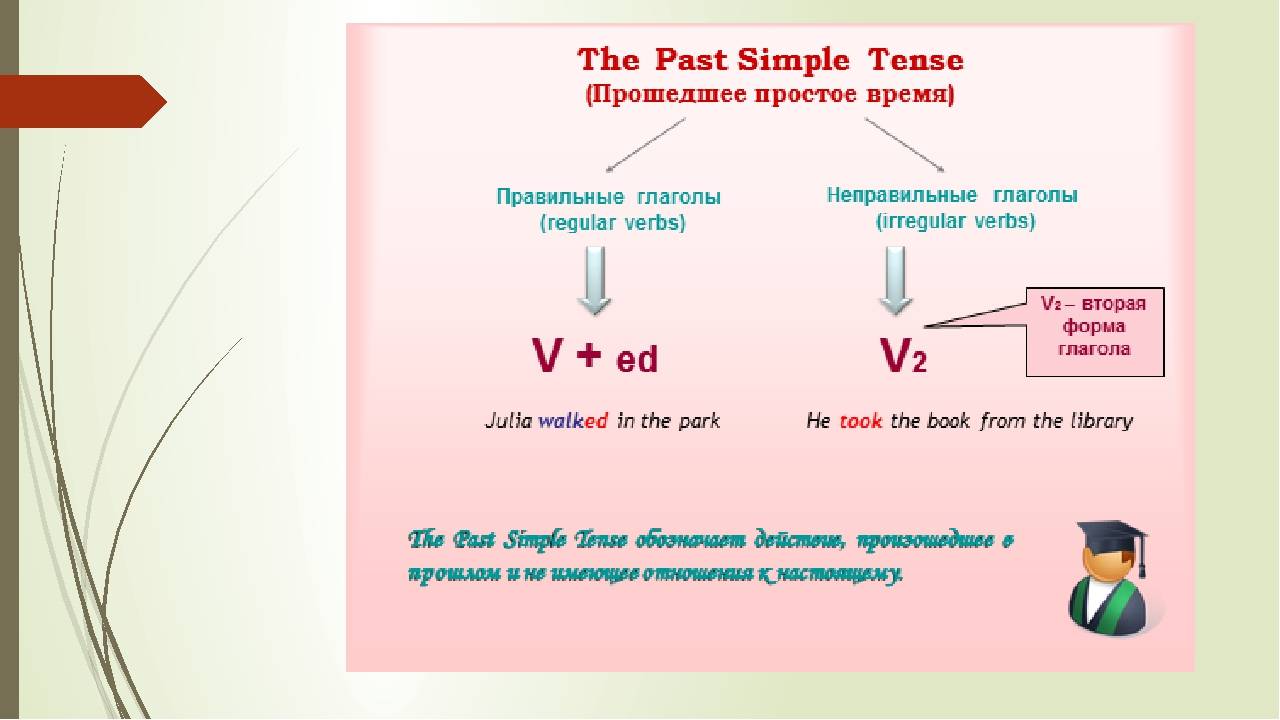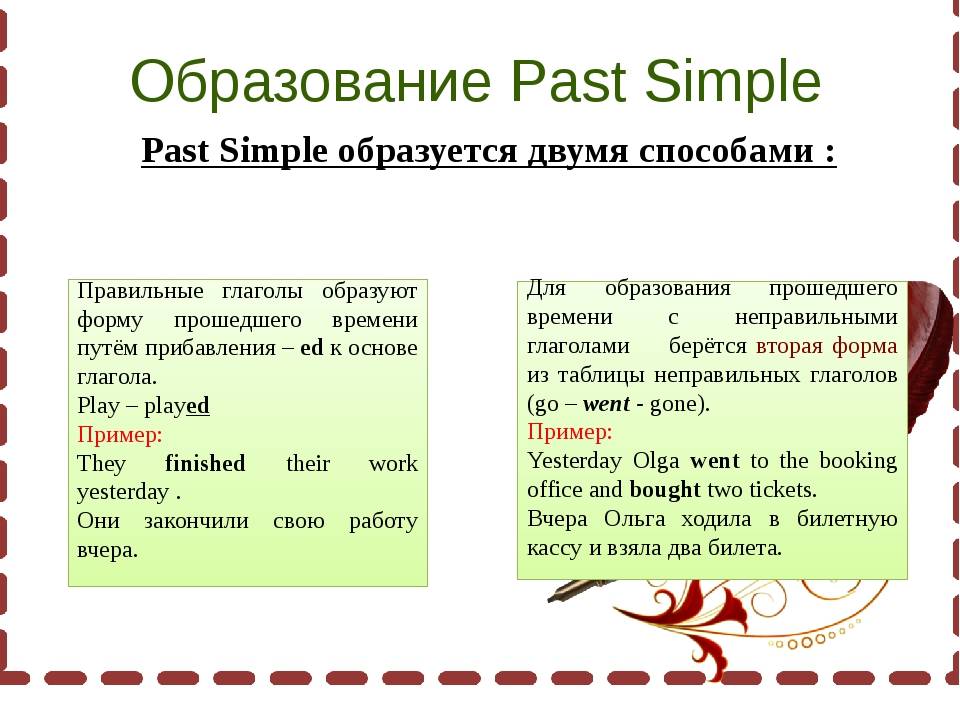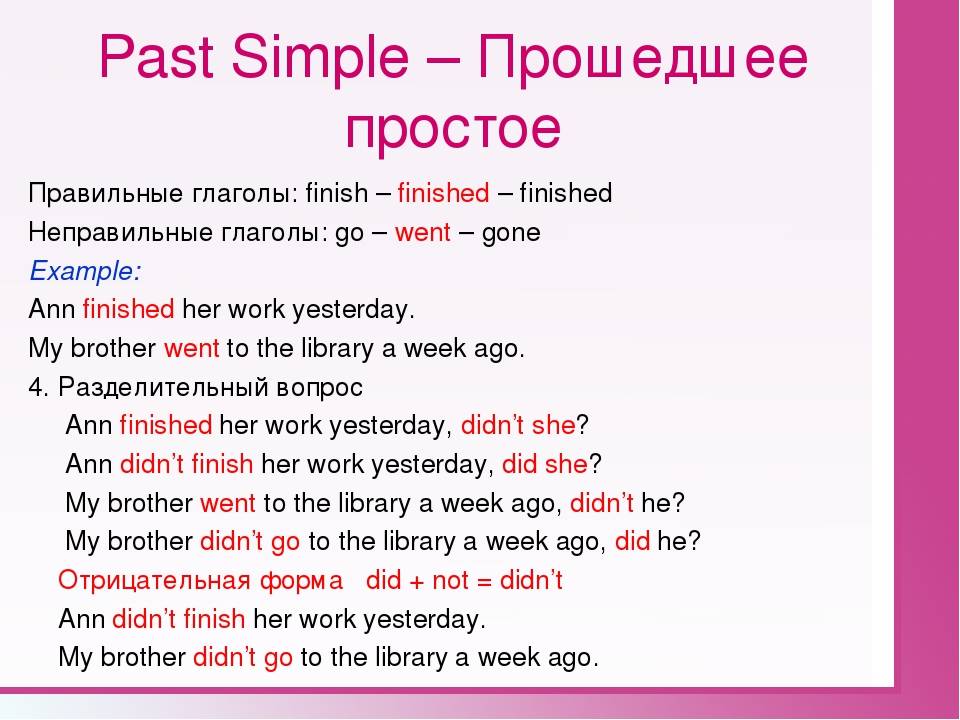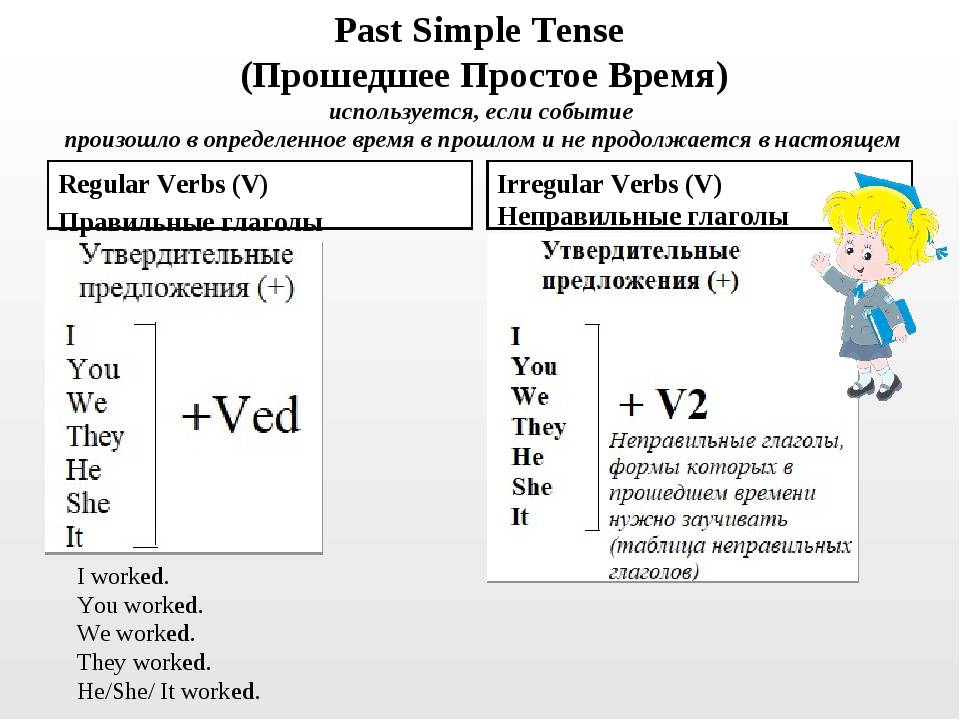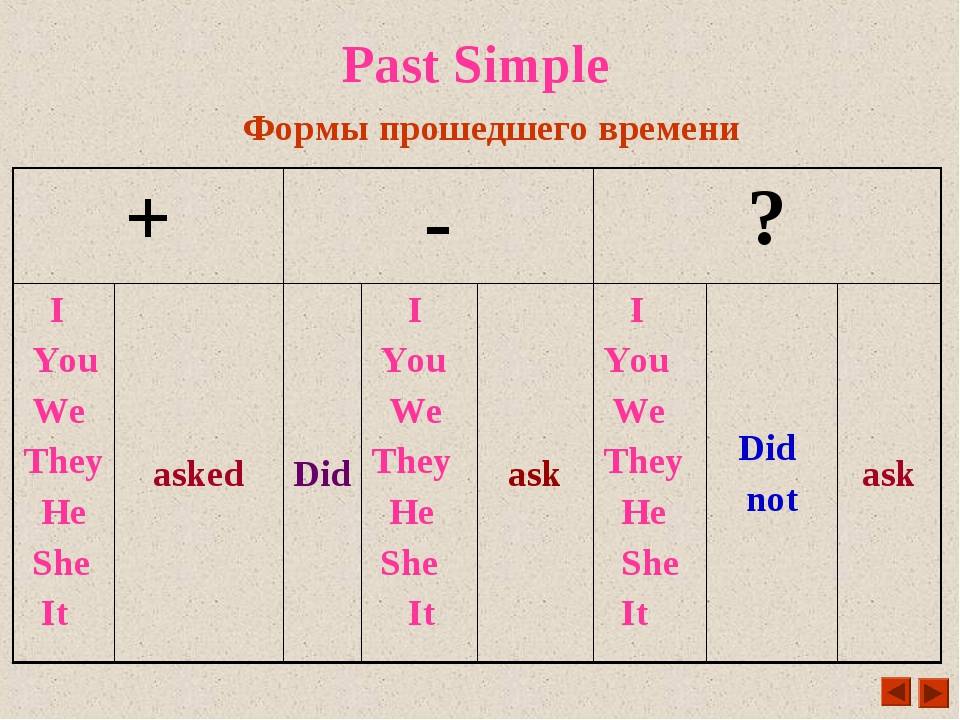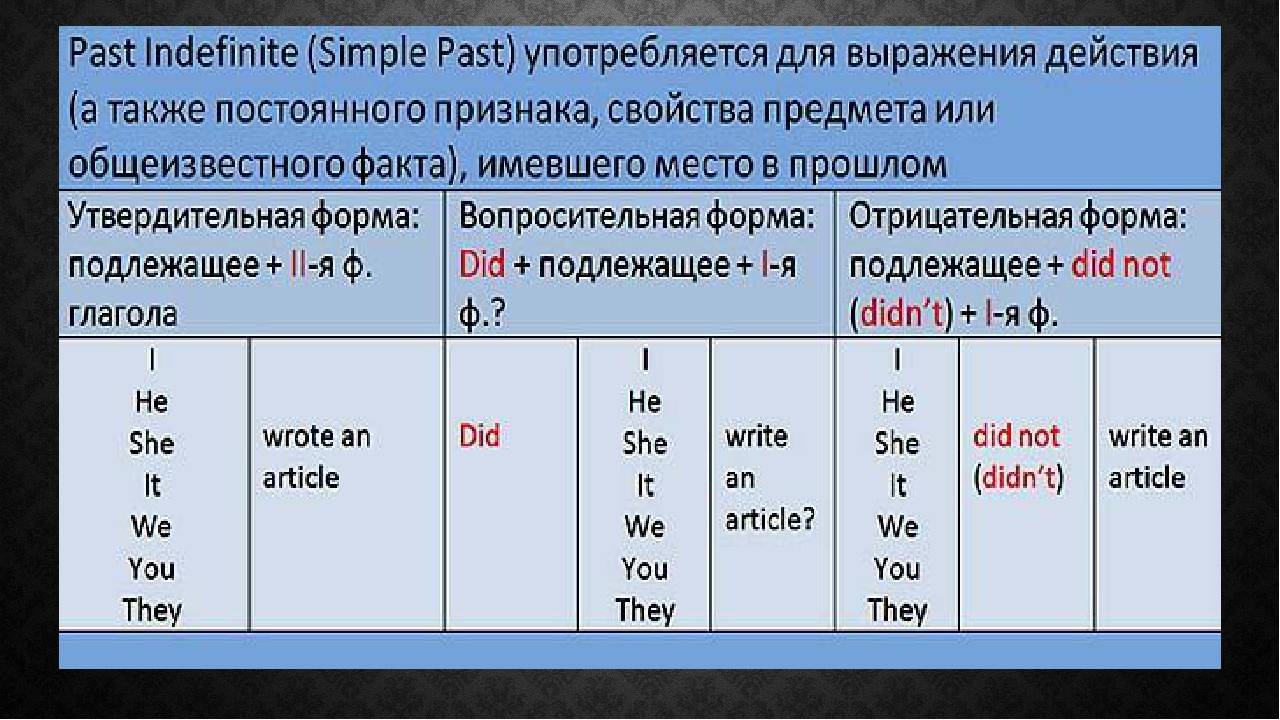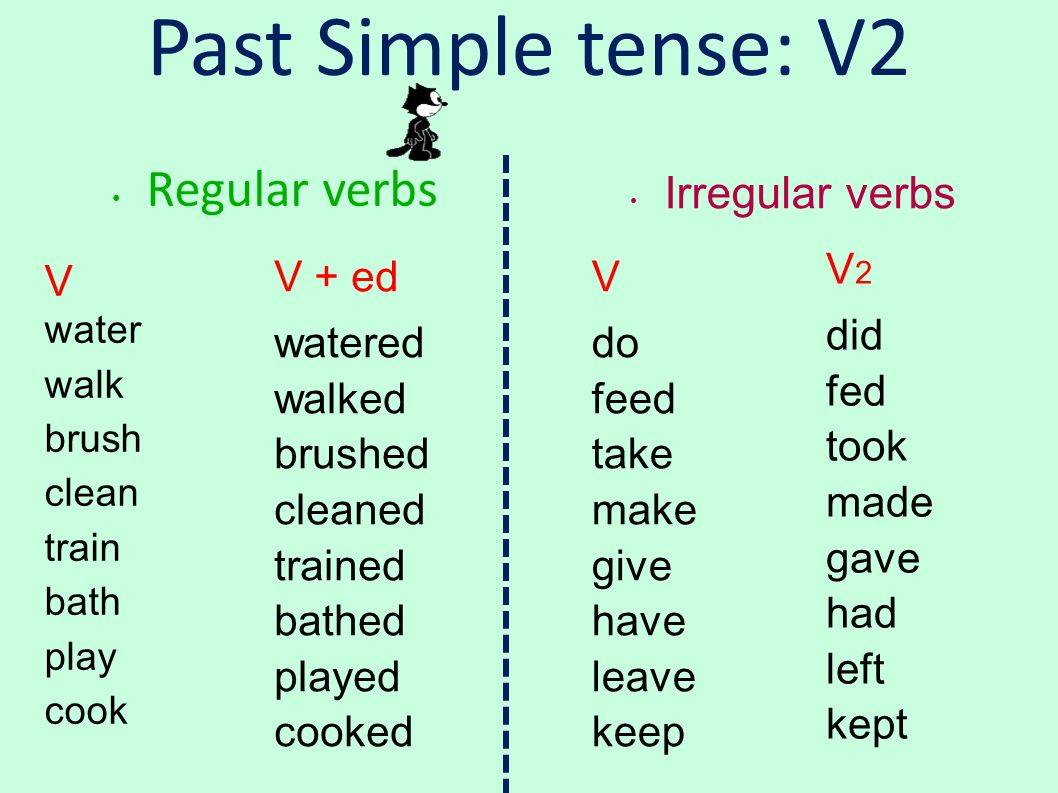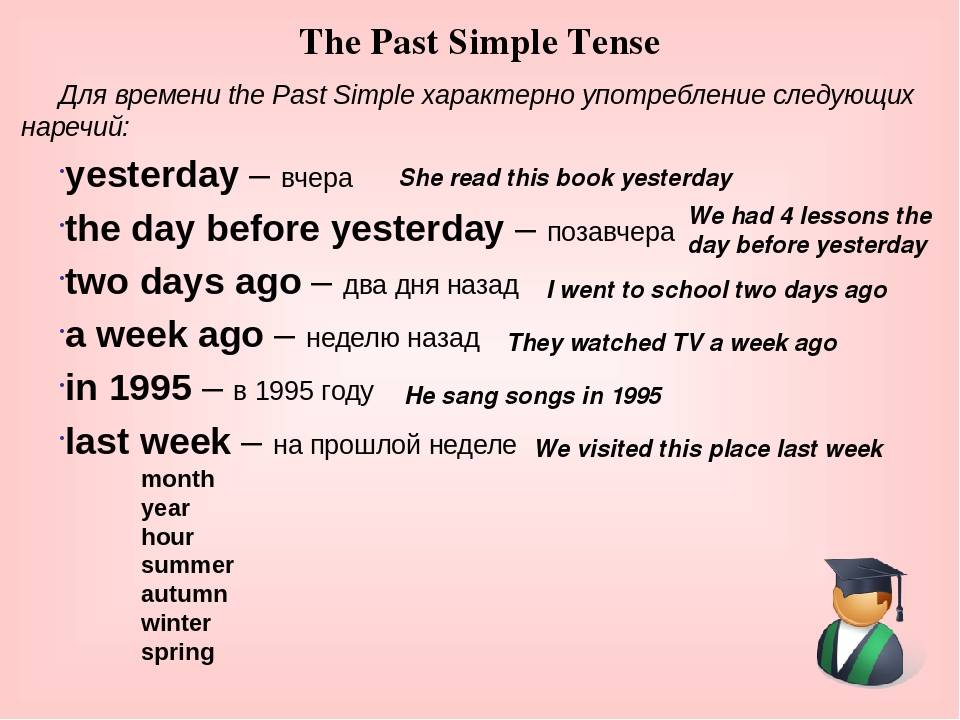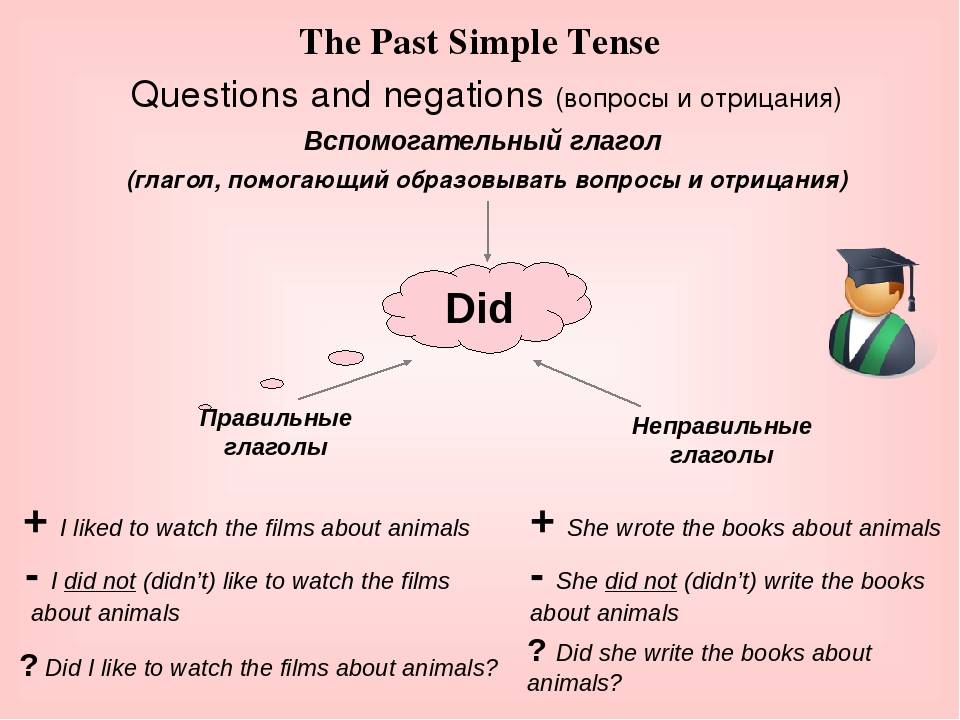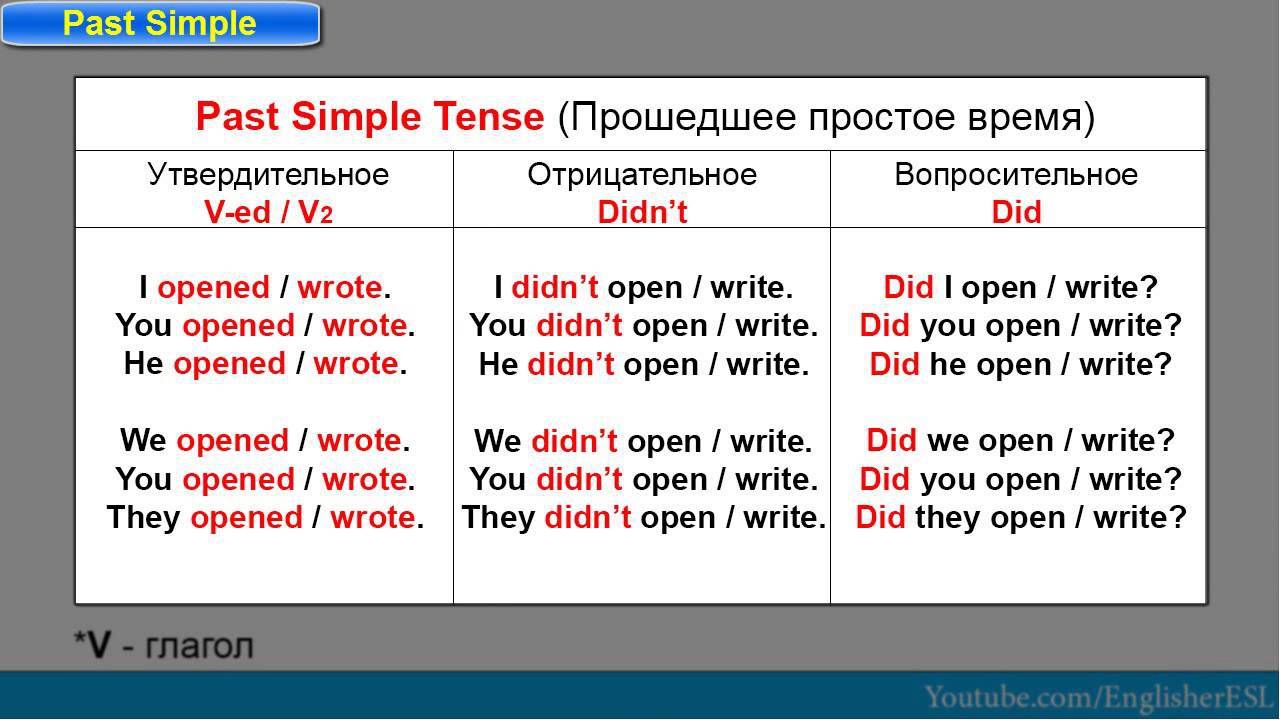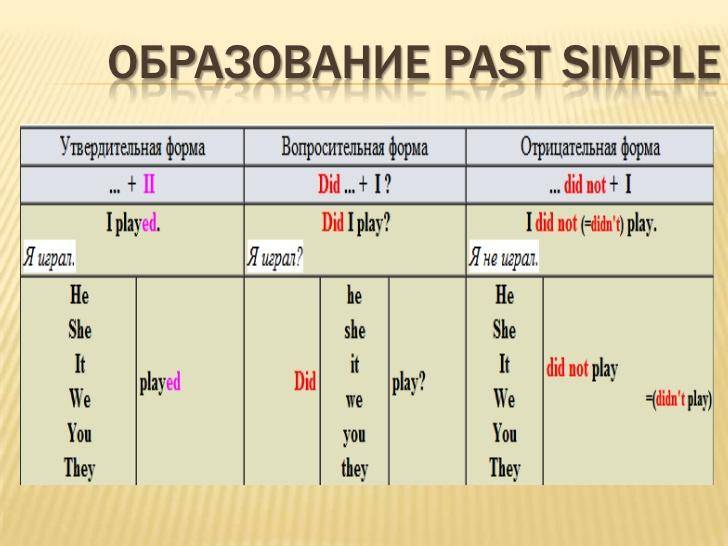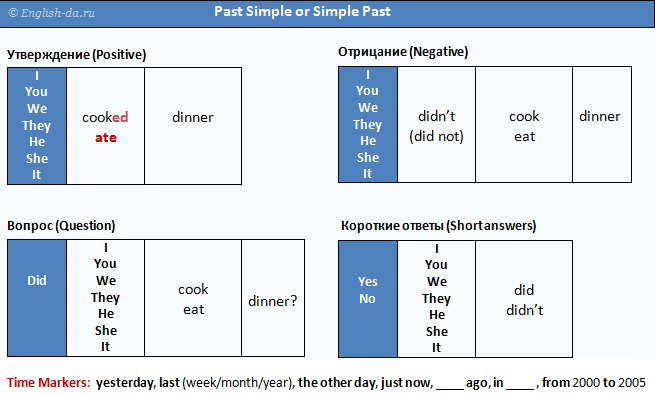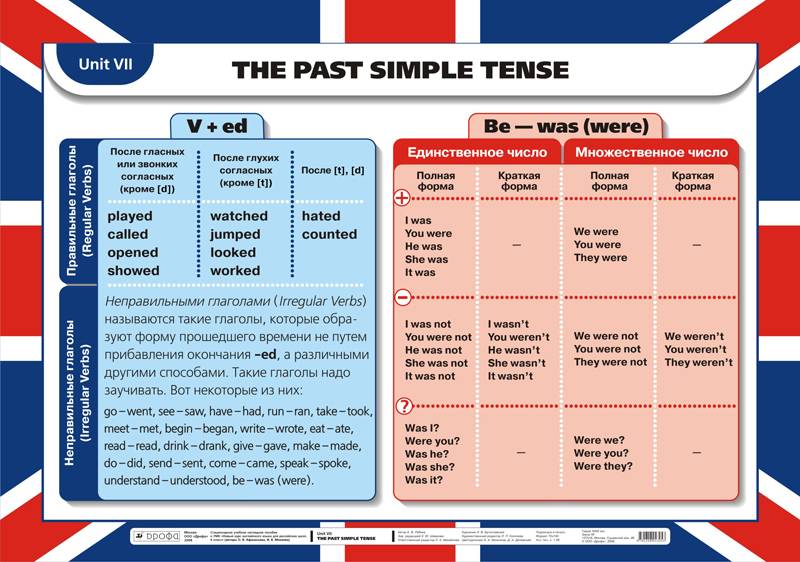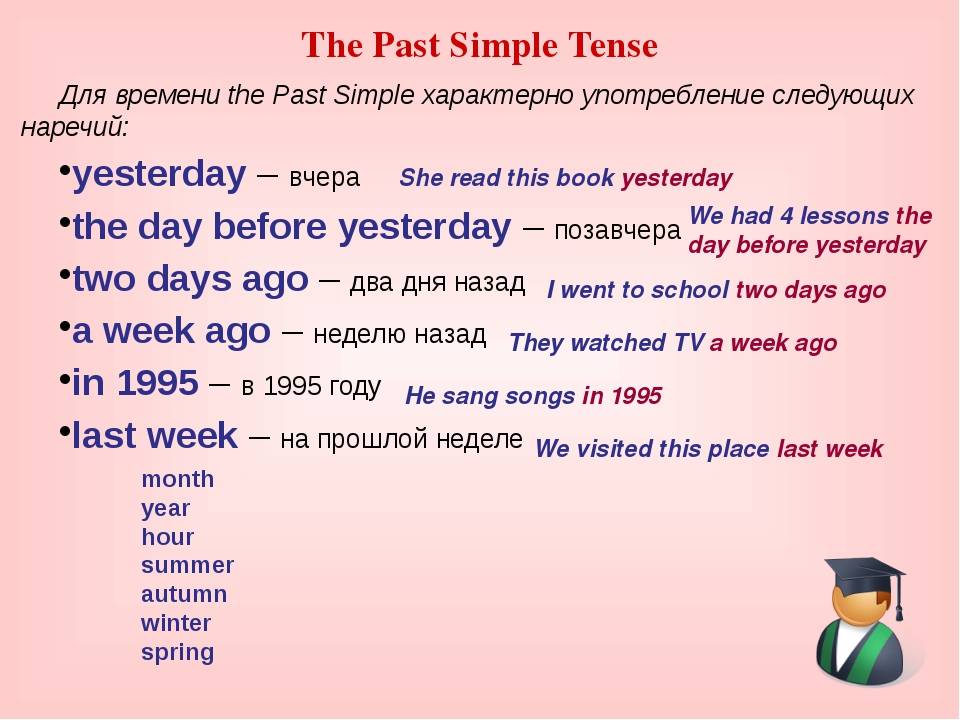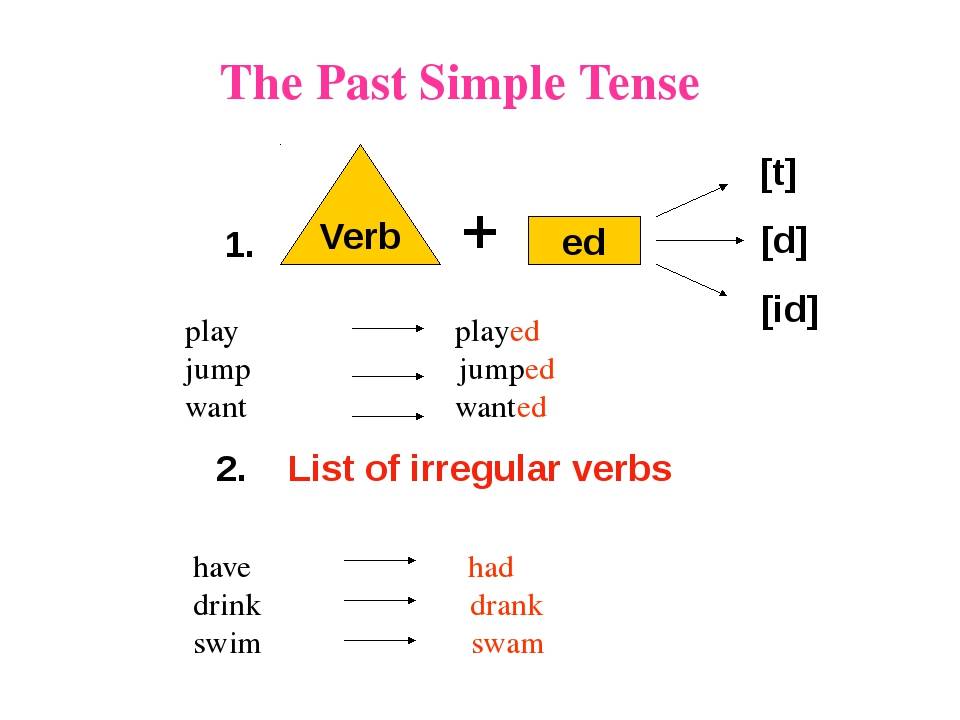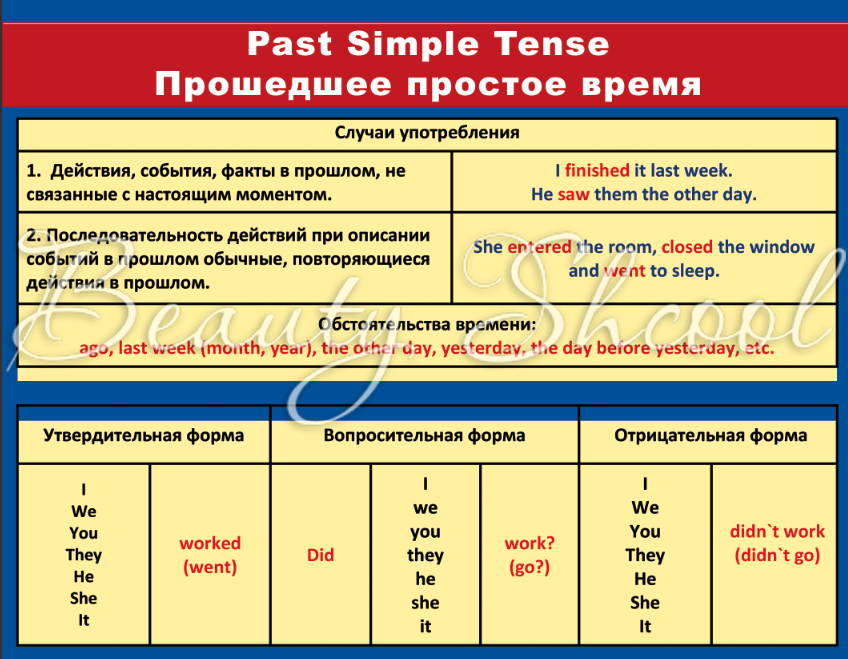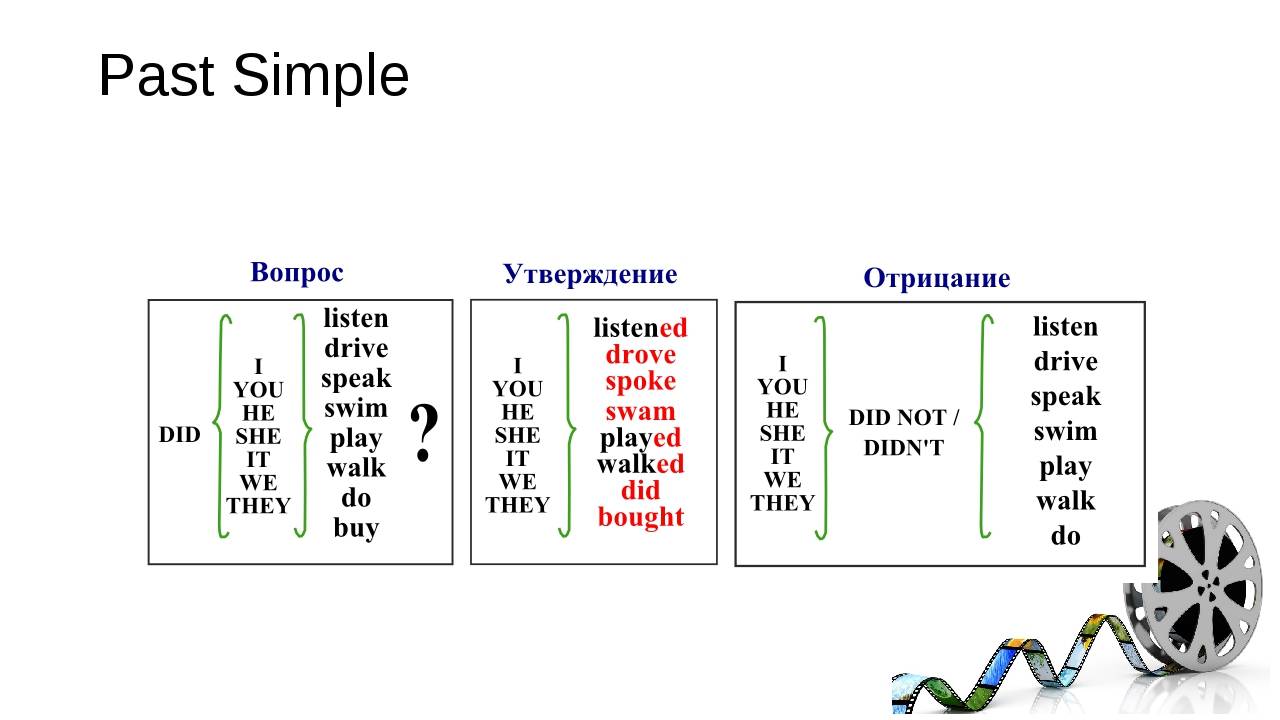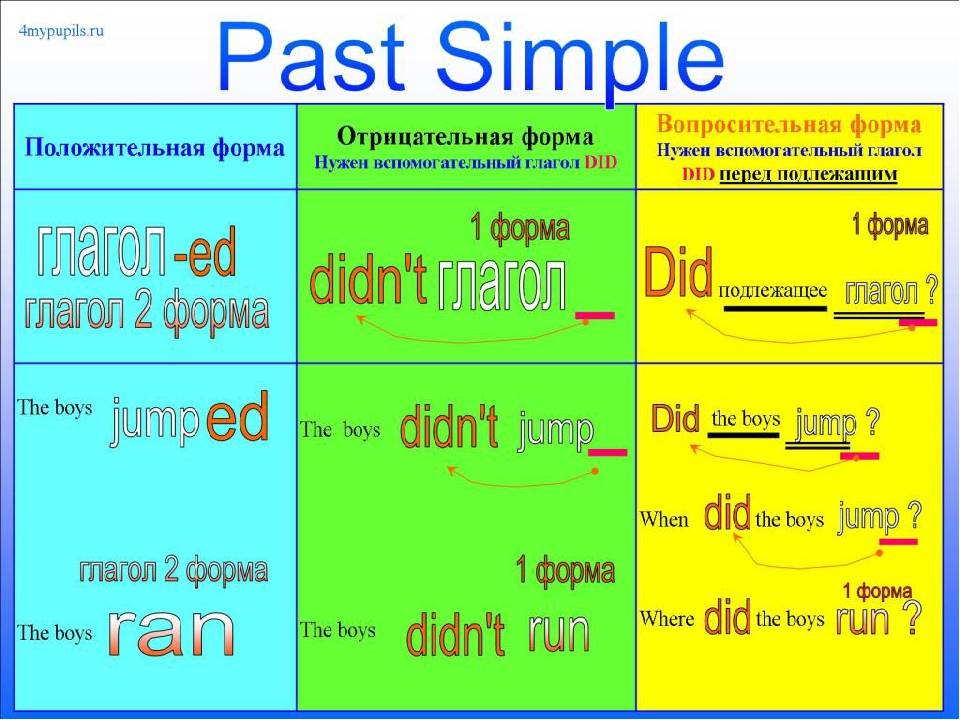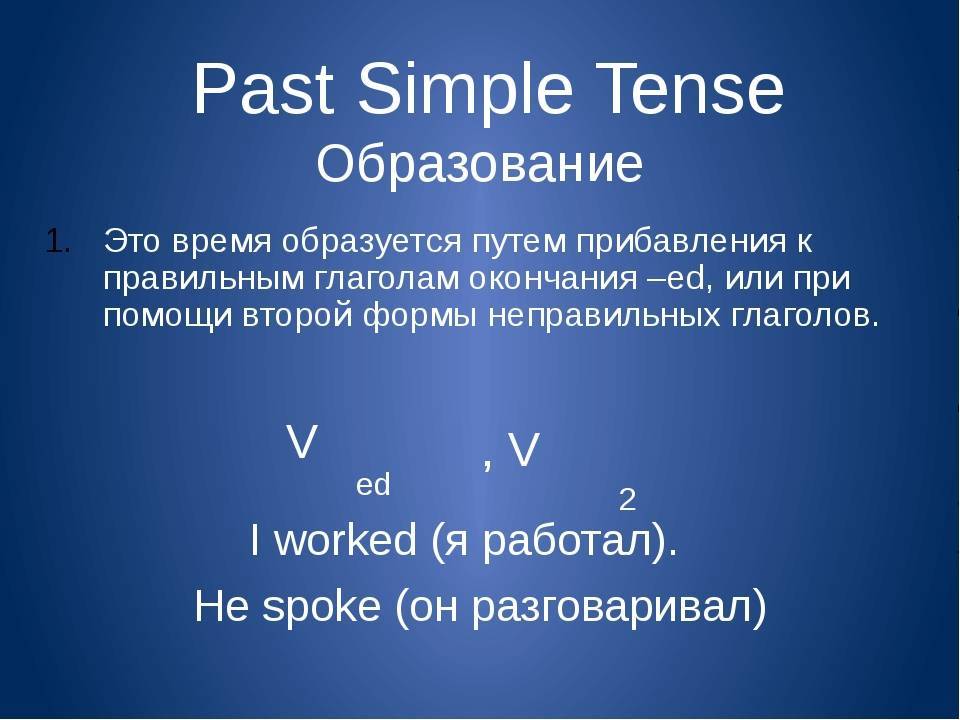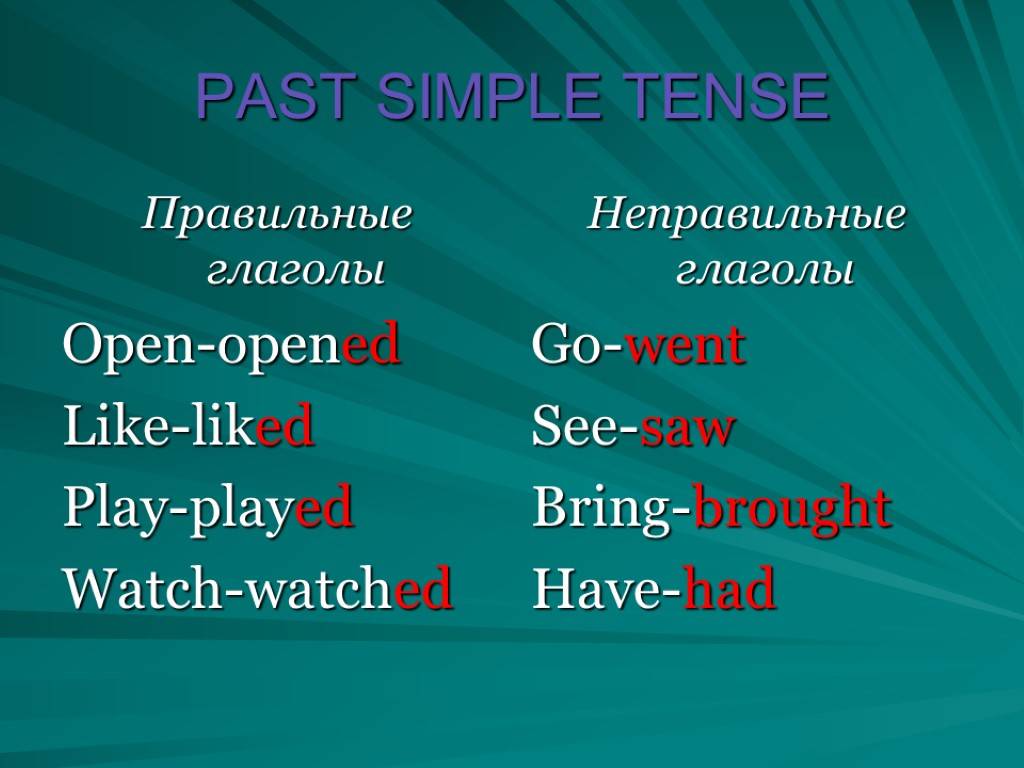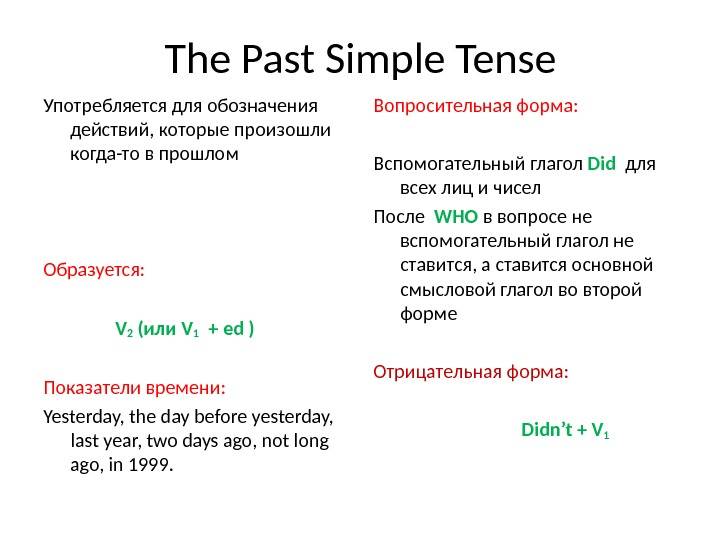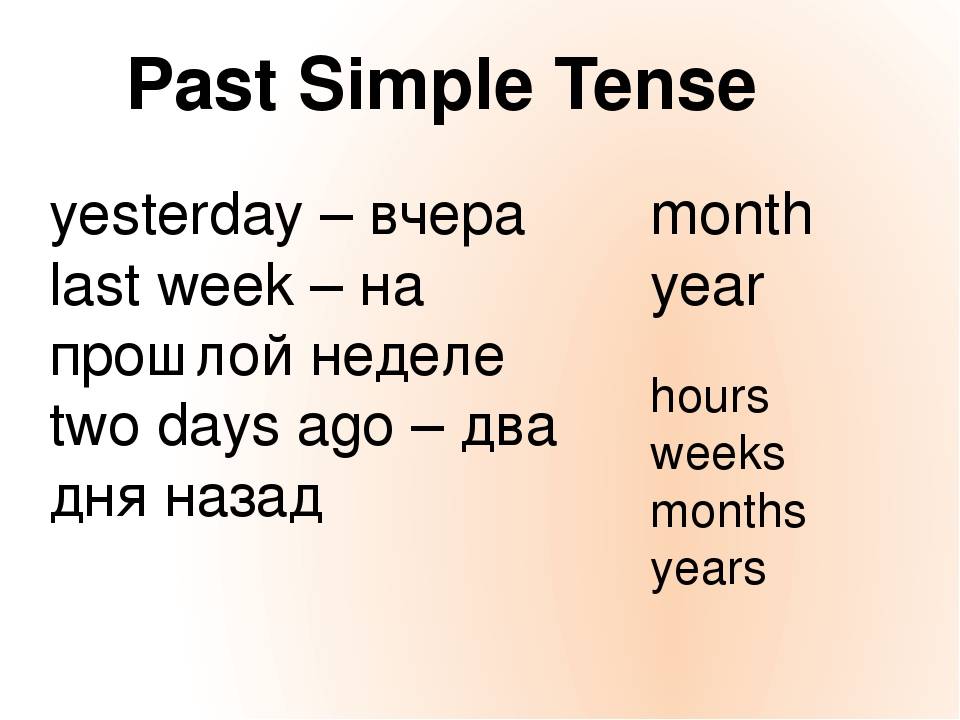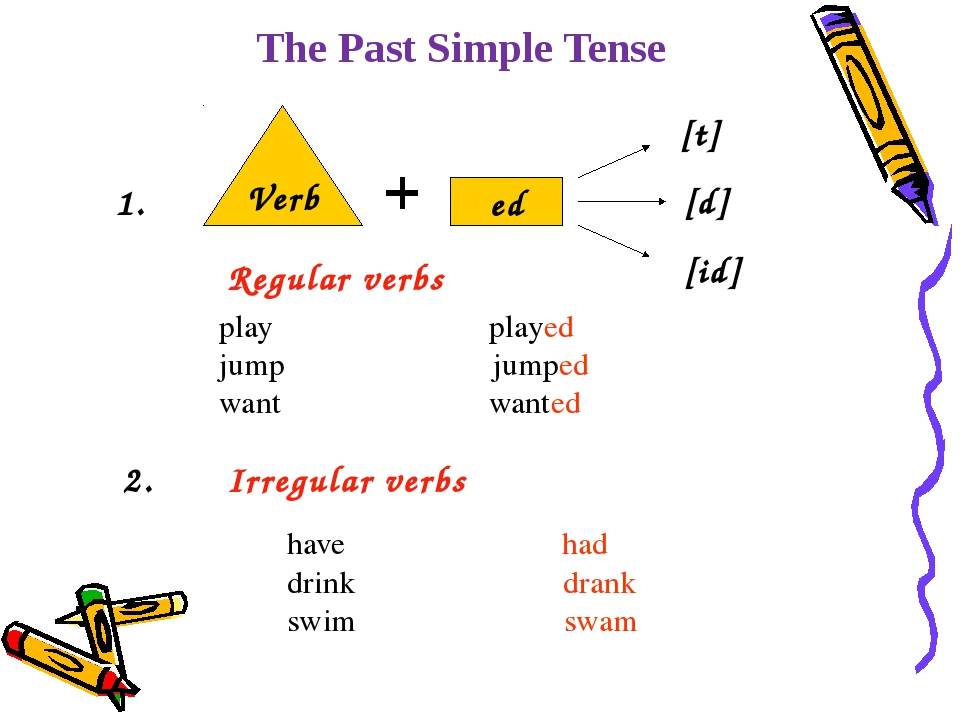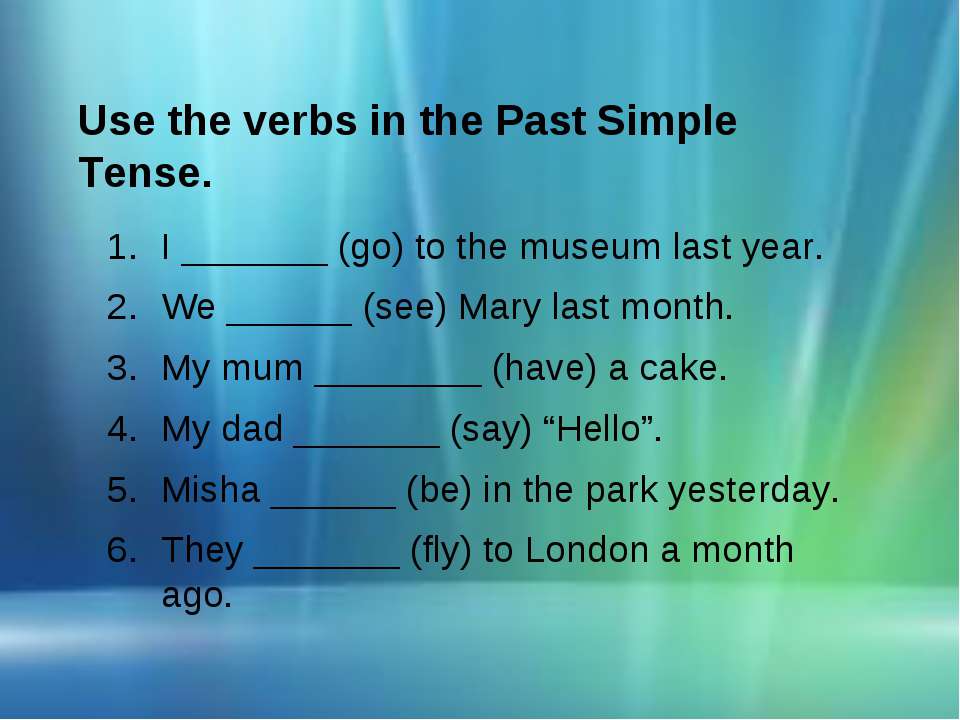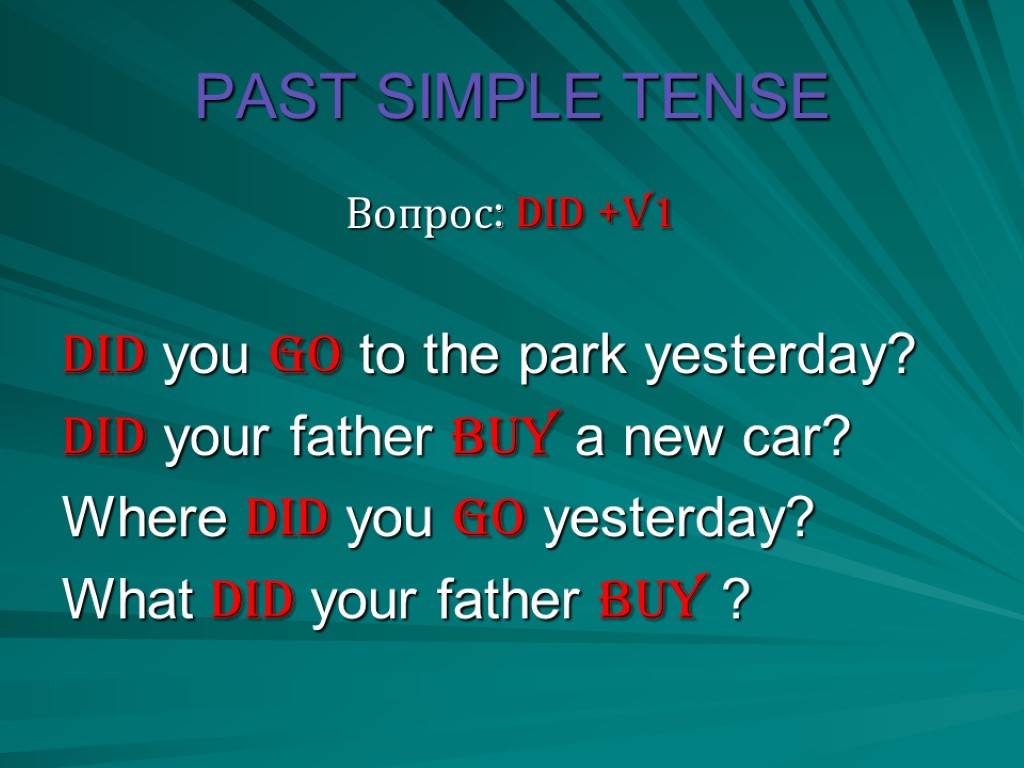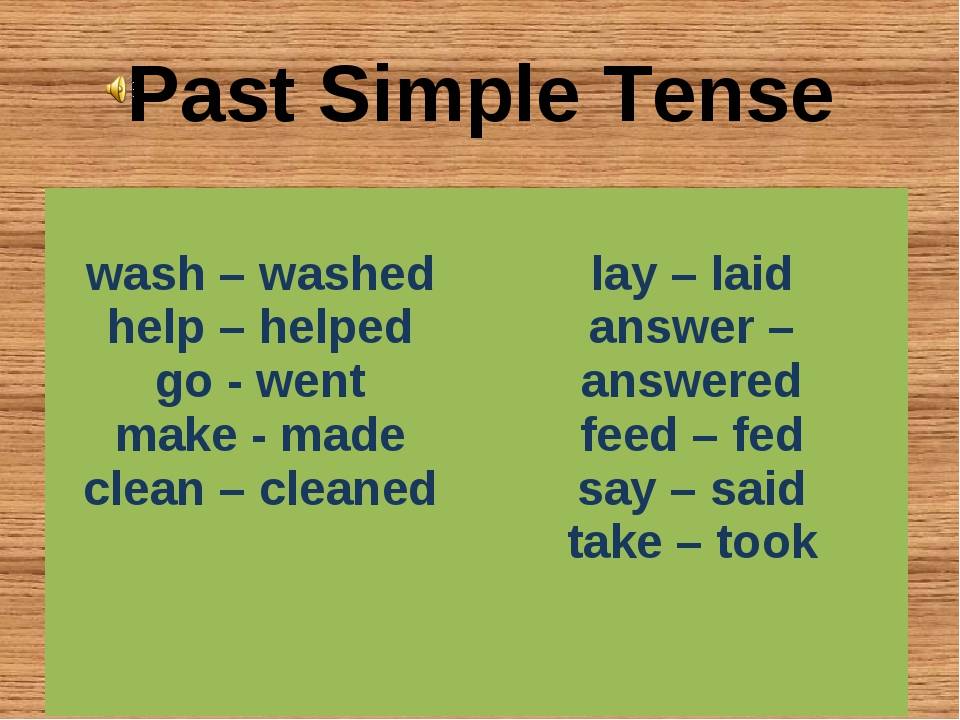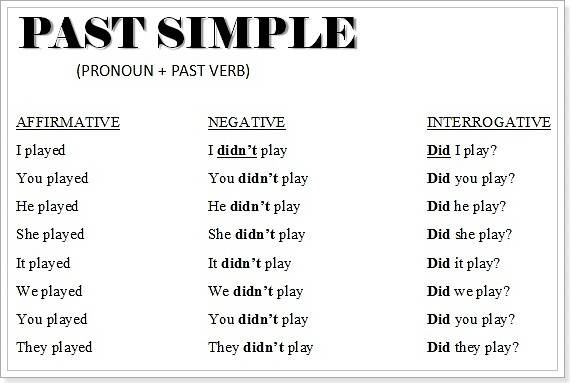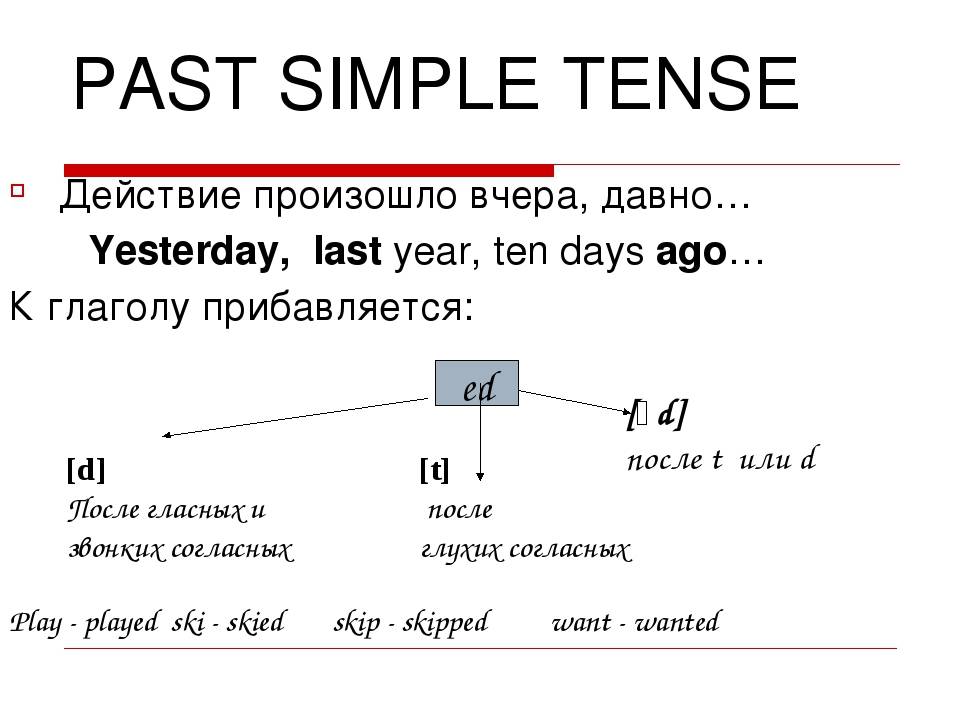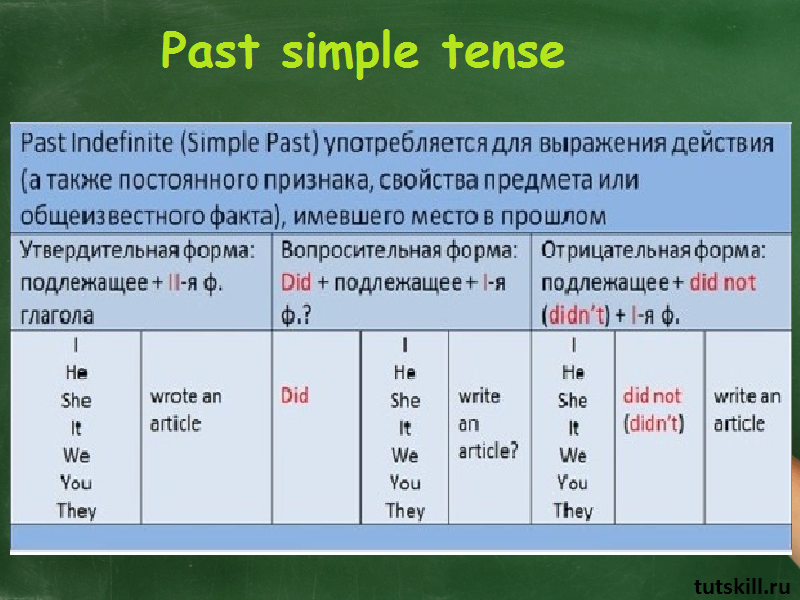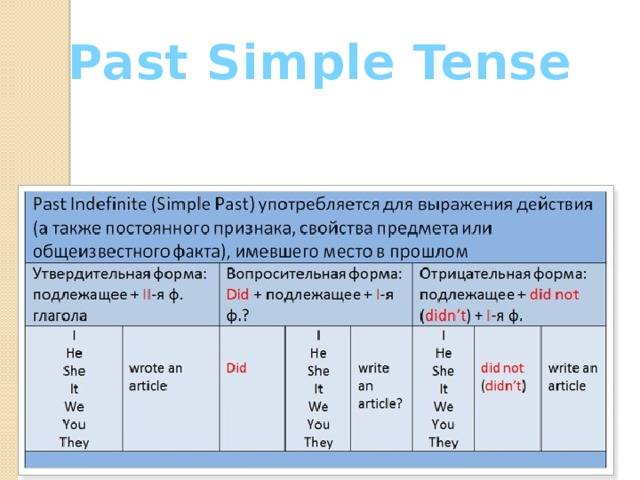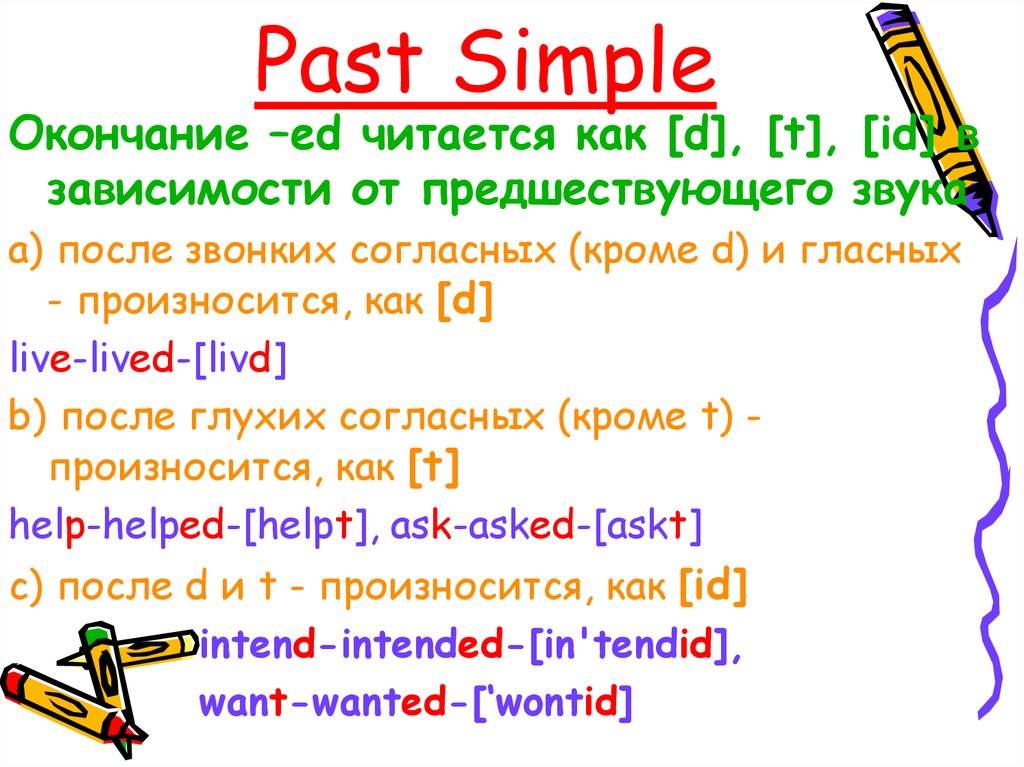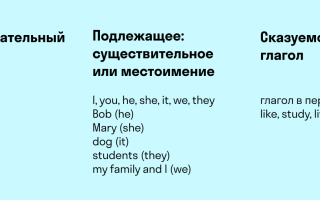Вопрос
Вот как в Past Simple образуются вопросительные предложения:
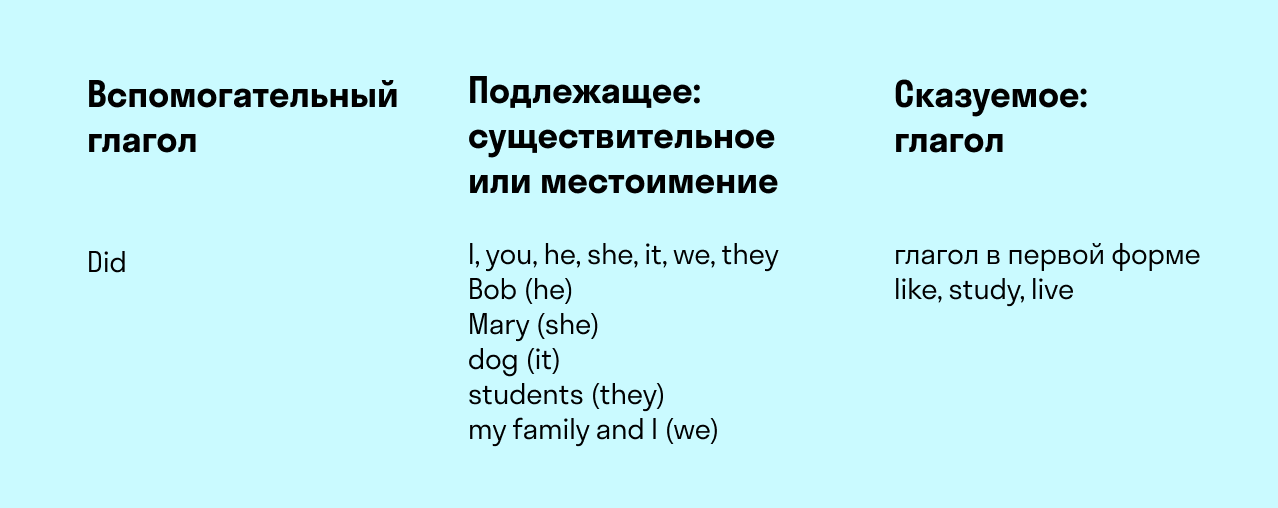
Примеры вопросительных предложений в Past Simple:
- Did Bob study medicine? — Боб изучал медицину?
- Did dog eat? — Собака ела?
- Did students like the movie? — Студентам понравился фильм?
На вопросы приходится отвечать. В английском нельзя ответить просто yes или no, в ответе нужно использовать вспомогательный глагол:

Часто вопрос начинается со специального вопросительного слова:
- when — когда
- who — кто
- where — где
- why — почему
Мы ставим такое слово на первое место в вопросе, а дальше идем по знакомой формуле:

Еще бывает так, что глагола-действия в вопросе нет, и мы используем глагол to be. Вот что с ним происходит в вопросах и отрицательных предложениях.
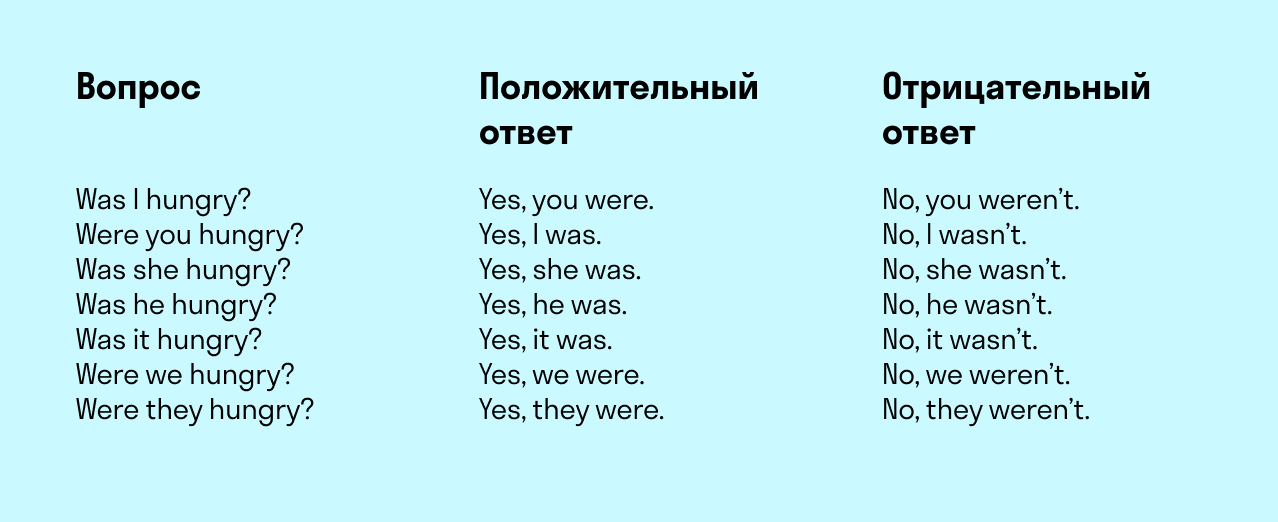
И с предложениями в паст симпл мы расправились. Теперь узнаем, в каких случаях употребляется простое прошедшее время в английском языке.
Употребление Past Simple Tense
Past Simpleупотребляется:
1. Для выражения обычного, регулярного прошедшего действия:
Last winter I spent a lot of time in the library. – Прошлойзимойяпроводилмноговременивбиблиотеке.
While she was in St.-Petersburg, she wrote us letters every week. Когда она была в Санкт-Петербурге, она писала нам письма каждую неделю.
Примечание: Кроме того, для выражения обычного действия в прошлом вместо Past Simpleочень часто употребляется
а) used to + инфинитив (см. Оборот used to)
— I used to swim a lot in summer but I don’t go swimming any more.- Ann used to have headaches, now she feels quite well.
б) would + инфинитив без to (см. Сравнение оборота used to и глагола would):
She would usually be happy when she returned home after a long trip — Она обычно бывала счастлива, когда возвращалась домой после долгого путешествия.
в) be used to / get used to
I get used to going shopping on Saturday. (см. Сравнение оборотов used to / be used to / get used to)
2. Для выражения прошедшего действия, совершившегося в истекшем отрезке времени.
а) время совершения действия может быть выражено с помощью yesterday вчера, last week на прошлой неделе, anhourago час тому назад, theotherday на днях, onMonday в понедельник, in 2000 в 2000 году, during the holidays во время каникул и т. п.:
Mary called me yesterday. Мэри позвонила мне вчера.The other day I met Paul. На днях я встретил Пола.Не came at six o’clock. Он пришел в шесть часов.
б) время совершения действия может быть выражено придаточным предложением:
The storm began whenI left home. – Шторм начался, когда я вышел из дома.
в) время совершения действия может быть не указано в предложении, а может только подразумеваться:
He got the injury at school. – Он получил эту травму в школе (подразумевается: когда учился в школе).
The house stood on the hill. – Дом стоял на холме.What did you say? – Что вы сказали?
4. Для выражения последовательности прошедших действий:
Не came to the table, took a pen and started writing. – Онподошелкстолу, взялручкуиначалписать.
Examples – Past Simple
Negative
- I didn’t talk to John yesterday.
- He didn’t steal those ideas from the company.
- You didn’t show me the photos from the wedding.
- Ron did not sign the document.
Yes/No Questions
- Did you ask Tina to go out with you?
- Did the employees stay late again last night?
- Did Rob finish his assignment yesterday?
Wh-Questions
- When did you buy that sweater?
- Why did the computer break down?
- How long did the train journey take?
- Why didn’t you tell me about the accident?
Tag Questions
- John scored a goal, didn’t he?
- Their dogs barked all night, didn’t they?
- Kate didn’t take out the rubbish bin, did she?
- The girls didn’t copy on the exam, did they?
Past Simple — упражнения на отработку
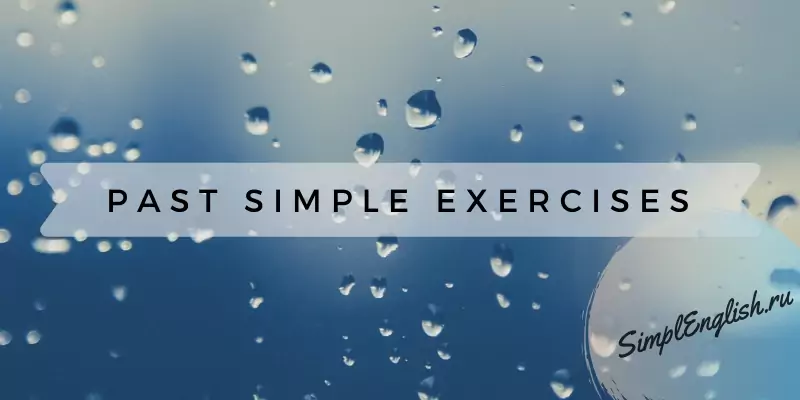
Практические упражнения позволяют протестировать усвоение нового материала и выявить пробелы в знаниях.
Упражнение 1. Поставьте глаголы в следующих предложениях в утвердительную, вопросительную и отрицательную формы Past Simple.
- I (to be) the only child.
- He (to play) with his friends.
- She (to write) a book.
- We (to go) to school.
- They (to buy) a house.
- Mike (to teach) at the local university.
- Helen (to do) her homework.
- You (to tell) the truth.
- You (to be) her guardian.
- It (to be) sunny today.
Упражнение 2. Раскройте скобки, употребляя глаголы в Past Simple.
- Alice (to have) a brother.
- Her brother’s name (to be) Michael.
- Ann (to be) a barista.
- She (to go) to bed at nine o’clock in the evening.
- She (to leave) for work early.
- For breakfast she (to have) an orange juice, a toast and a cup of coffee.
- She (to do) her homework every day after school.
- After lunch she (to go) home.
- Usually she (to take) a taxi.
Упражнение 3. Используйте слова в скобках для образования предложений в Past Simple
Обратите внимание, в какой форме должно стоять предложение (утвердительной, вопросительной или отрицательной)
- They ____ tennis at the school. (to play)
- She ____ any books. (not/to read)
- ___ you ___ French? (to speak)
- My mother ____ to cook. (not/to like)
- ___ Ann ___ any boyfriends? (to have)
- His brother ___ at high school. (to teach)
- She ___. (cannot/to read)
- ___ they ___ their room? (to clean)
- His wife ___ a car. (not/to buy)
- ___ Elizabeth ___? (to smoke)
Упражнение 4. Переведите на английский язык:
- 1) Она была занята. (to be busy)
- 2) Я не был дома.
- 3) Они не знали.
- 4) У него ничего не было?
- 5) Она читала немецкие журналы?
- 6) Они никогда не смотрели кино.
- 7) Он был на работе.
Ответы на упражнения
Сверьте свои ответы с правильными.
Упражнение 1.
- I was the only child.
- He played with his friends.
- She wrote a book.
- We went to school.
- They bought a house.
- Mike taught at the local university.
- Helen did her homework.
- You told the truth.
- You were her guardian.
- It was sunny today.
Упражнение 2.
- Alice had a brother.
- Her brother’s name was Michael.
- Ann was a barista.
- She went to bed at nine o’clock in the evening.
- She left for work early.
- For breakfast she had an orange juice, a toast and a cup of coffee.
- She did her homework every day after school.
- After lunch she went home.
- Usually she took a taxi.
Упражнение 3.
- They played tennis at the school.
- She didn’t read any books.
- Did you speak French?
- My mother didn’t like to cook.
- Did Ann have any boyfriends?
- His brother taught at high school.
- She couldn’t write.
- Did they clean their room?
- His wife didn’t buy a car.
- Did Elizabeth smoke?
Упражнение 4.
- She was busy.
- I wasn’t at home.
- The didn’t know.
- Did he have anything?
- Did she read German magazines?
- They never watched any movies.
- He was at his work place.
Таким образом, время Past Simple – простое прошедшее – является одним из самых распространенных и простых для понимания английских времен глаголов. Паст симпл встречается в речи чаще, чем настоящее время, а перечень его функций очень длинный.
https://youtube.com/watch?v=6Qd1xAikoQc

